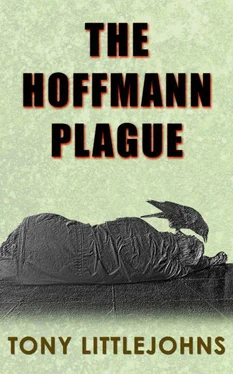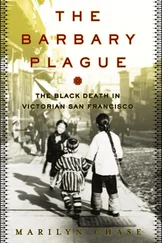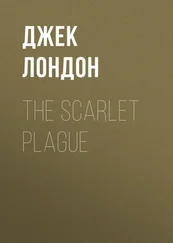Tony Littlejohns
THE HOFFMANN PLAGUE
Dedicated to the memory of my dear mother, Marjorie.
With huge thanks to my family for their enthusiasm and help; who spurred me on through the difficult times in the writing process and couldn’t wait for each new chapter!
He wondered if he might see the woman again, or if she was even still alive. If she’d survived this long there was a good chance that she would be, or so he hoped. That had been nearly three weeks ago; she’d been the first living person he’d seen in over two months.
The glare from the morning sun off the sea and the wet sand hurt his eyes, exacerbating his headache and making it difficult to concentrate. He turned around and headed west instead, which made it a little easier. He should have brought his sunglasses with him but he’d forgotten them and kicked himself. There were many things he needed to be more mindful of, and should be doing or planning; he knew that.
It was a beautiful April morning but he didn’t appreciate it as he would have done in happier times. He was hungry; the reason for the headache. His last meal the evening before had been a meagre affair of red lentils cooked with a stock cube, some dried onion flakes and half a tin of carrots. Nothing to write home about , he thought. Not that there’s any home left to write to… Or postal service to deliver it! He smiled grimly to himself.
There was no fresh produce left anywhere, not for a long while, so he was living on tinned, dried and pickled food. He’d been eking-out his meals in recent weeks, but his stock of food in the flat was getting low; hence that morning’s forage for shellfish along the beach. He still had a small supply of canned meats and other high-calorie food, but wanted to save them for desperate times ahead. He knew they wouldn’t last much longer if he relied solely on them – as he had been doing until now – which was why he’d been going out to forage. Desperate times weren’t far off, seemingly.
He’d already found some small mussels and limpets amongst the rocks, enough for some much-needed protein with his other food. He was hoping to find some razor clams, which would be a great bonus. So far, though, he was unsuccessful, and the reason he was concentrating so hard to find their holes at low-tide. He knew there were razor clams in the area as he’d seen their shells occasionally when walking on the beach, though he’d never tried collecting them before. Most of Bexhill beach was pebbles and shingle, but at low tide large areas of sand became exposed, especially on the eastern side.
He thought again of the woman; who she was, where she lived and how she’d survived. When he’d seen her before, he was just coming out of the sea after going down to bathe for the first time in weeks. She had been less than a hundred yards away down the beach and hadn’t seen him while he was in the water. When he’d emerged from the sea he had seen her to his left and had shouted and waved. He’d been naked, of course, and she had turned and run away beyond the promenade. By the time he’d put on his clothes and boots and ran after her, she was long gone. He’d sat on the promenade and cried with frustration, grief and loneliness, cursing and swearing. The pandemic had killed his family, his friends and, seemingly, almost the entire population of Bexhill.
From the corner of his eye he saw a spurt of water from a small hole in the sand. Amazed, he moved quickly but softly over to it. He poured some salt into the hole from the small tub he’d brought with him and waited, then saw the top of a razor-clam’s shell appear. He grabbed hold of it between his fingers but didn’t pull; just held on. After a while the clam relinquished its grip and he was able to pull it out. He laughed for the first time in months and put it in his bucket. In the next ten minutes he got two more, which was enough for a meal with the other shellfish, so he headed home feeling rather pleased with himself.
Walking back along Sackville Road, there were uncollected refuse bags torn open by seagulls, their contents scattered across the pavement and road. Many cars still lined the street, a couple of them parked at odd angles – abandoned by their owners in haste. In one car on the other side of the road a corpse sat rotting in the driver’s seat. The town was utterly silent apart from the screeching of gulls.
Thankfully, there had been relatively few corpses on the streets. He’d seen some – often smelling them beforehand – and given them a wide berth, but the week before he’d come across a body on the beach that had made him vomit. It was a homeless guy with a Big Issue bag next to him, in the advanced stages of decomposition. There wasn’t much left of him after the seagulls and other creatures had had their fill.
He looked at each shop, making a mental note of which ones might be worth breaking into to see if he could find anything useful. The fishing tackle shop was a priority. With a rod and reel and some lures or beach-casting tackle he could start fishing. Wow! Fresh fish would be great. He’d been motiveless for long enough and it was time to get organised.
He stopped walking as he thought of something: Bexhill Sea Angling Club by Galley Hill, at the promenade’s eastern end. There were many boats on the beach there: with a small boat and a pair of oars he could get out on the sea, which would increase his chances of catching fish dramatically. He felt sure he’d find a pair of oars there somewhere. He didn’t know anything about boats, but how hard could it be? He carried on walking, lost in thoughts of his new plans and feeling energised by them.
If he’d turned around at that moment he might have seen a person silhouetted on the skyline. From the rooftop of the De La Warr Heights building the woman was watching him through a pair of binoculars. Crossing over into Terminus Road he noticed a window open in a house, and as he walked past he could smell decomposing bodies. He put his head down and walked faster.
Back home, he cooked the shellfish on his Coleman camping stove, which ran on petrol. Over the last week he’d managed to get enough fuel for his needs from the cars in his road; he didn’t want to use his own stock until he had to. There had been no electricity or gas for many weeks; or was it months? He’d lost track of time. He still had a few jars of pickled eggs, so he sliced one and added it to the pan, along with some gherkins and half a tin of potatoes. While it simmered he made himself a coffee. He had many packets of coffee beans, which he ground on a manual grinder; it was a personal luxury he would sorely miss when it was gone.
He ate the food with relish and it seemed like a feast to him with the fresh shellfish. Afterwards, he sat down on the old sofa in the lounge and rolled a cigarette to have with his coffee. He knew that he needed to be more proactive, and to start planning ahead and doing more to ensure his survival, including raiding all the surrounding houses to see what food he could find. He couldn’t bring himself to do it yet as all the houses would have rotting corpses in them. He’d existed in a scared, depressed and apathetic state for too long, despite his initial foresight and good sense in stockpiling food and supplies when it had started around four months ago.
As he sat there he made notes, writing down ideas as they came to him. Clearly, he wasn’t the only person to have survived; there was the woman he’d seen and he assumed there must be others around, too. He wasn’t sure how he felt about that: on the one hand, company would be good and they could help each other; on the other hand, in the lawless state that now existed, it would be survival of the fittest and Darwinian law would rule. If he had things that others needed, they might fight or kill to get them. He’d never been a violent man and the thought worried him, but he realised he needed to prepare himself, both mentally and physically, for such eventualities. He’d worked in engineering, landscaping and handyman-type jobs most of his life so had a good collection of tools. He looked through them and found his gardening machete and scabbard, a claw hammer and a sheath knife. He also picked out a small wrecking bar, which would be useful for breaking into places, and resolved to carry them with him whenever he went out.
Читать дальше












